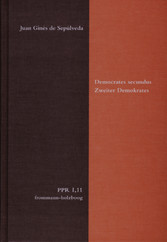Suchen und Finden
Service
Democrates secundus. Zweiter Demokrates
von: Juan Ginés de Sepúlveda, Thomas Duve, Alexander Fidora, Heinz-Gerhard Justenhoven, Matthias Lutz-Bachmann, Andreas Niederberger
Reihe: Politische Philosophie und Rechtstheorie des Mittelalters und der Neuzeit., Band: Abteilung I: Texte. - PPR I,11
frommann-holzboog Verlag e.K. , 2018
ISBN: 9783772830990 , 266 Seiten
Format: PDF
Kopierschutz: Wasserzeichen


Preis: 168,00 EUR
Der bedeutende Humanist Juan Ginés de Sepúlveda war der große Widersacher von Bartolomé de Las Casas in der während des 16. Jhdts. öffentlich ausgetragenen Kontroverse um die Rechtfertigung der spanischen Eroberung der Neuen Welt und die moralische Vertretbarkeit der Unterwerfung und Versklavung ihrer Ureinwohner. Seine Sicht der Dinge legte Sepúlveda in einem >Democrates secundus< betitelten Dialog vor, dessen Hauptargument darin bestand, nachzuweisen, dass es sich bei den Bewohnern der Neuen Welt um Barbaren von der Art handelte, die Aristoteles in seiner >Politik< als »Sklaven von Natur aus« definiert hatte. Ziel des Dialogs, dessen Publikation in Spanien jahrhundertelang verboten blieb, war der Aufweis, dass die den »Barbaren« der Neuen Welt natürlich gegebene Wesensverfassung sklavisch ist und gravierende Verstöße gegen das menschlich Gebotene, etwa in Form von Menschenopfern und Kannibalismus, nach sich ziehen musste. Die spanische Conquista sei daher aus zwei Überlegungen als gerechtfertigt anzusehen: aus Gründen der humanitären Intervention zur Unterbindung weiterer unmenschlicher Greueltaten einerseits und zum Nutzen der Unterworfenen andererseits, die eine ihrer natürlich sklavischen Wesensart entsprechende despotische Herrschaft erhalten würden. Sepúlvedas Dialog unternimmt dabei den Versuch, diese Auffassung durch die Lehren großer Philosophen, Theologen und Juristen in gelehrter Ausführlichkeit zu belegen. When in 1550 and 1551, Juan Ginés de Sepúlveda and Bartolomé de Las Casas famously quarreled over the justification of the Spanish conquest of the New World before the Royal and Supreme Council of the Indies at Valladolid, their arguments mostly repeated and reflected a longstanding tradition of the academic discussion of the just war theory. The main tenets of this discussion had been received, collected, expanded and transferred to the specific case of the Conquista during the preceding two generations of Spanish philosophers, theologians and experts in both laws. Particularly the erudite scholar Sepúlveda seems to have given hardly more than a brief sketch of the main tenets that were on the table in the 16th century in the debate of Valladolid, referring to the four key arguments he had assembled and learnedly demonstrated in his ambitiously written, but unpublished dialogue >Democrates secundus or On the just causes for a war< (at the indios). In this dialogue, the four arguments are presented and defended by a learned Greek, Democrates, who tries to prove the legitimacy of the Spanish conquest and dominion in the New World against a German called Leopold, who echoes pacifist views reminiscent of Erasmus of Rotterdam. The four arguments of the >Democrates secundus< are: the barbarian status of the indigenous people and their condition of natural slaves, their offenses against Natural Law, the need for humanitarian intervention given the widespread practice of human sacrifice and anthropophagy, and the right of free religious and cultural exchange. As Sepúlveda presents these arguments, he is eager to show that all of them were advanced by philosophers, jurists and theologians of high reputation: Augustine and Thomas Aquinas, Ulpianus and Gerson, and, above all, Aristotle, whose political philosophy is the basis for Sepúlvedas reasoning throughout the dialogue. It was precisely this kind of reasoning that transferred Aristotle's theory of natural slavery to the people of the New World which was responsible for the harsh criticism that Sepúlveda had to face from Las Casas and most other Spanish theorists of the time. Due to this criticism, Sepúlveda's dialogue was never given the royal privilege to be published and it was only in the late 19th century that the first of a very small number of extant manuscripts of the >Democrates secundus< was rediscovered.
Alle Preise verstehen sich inklusive der gesetzlichen MwSt.




